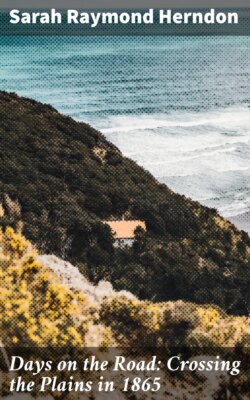Читать книгу Days on the Road: Crossing the Plains in 1865 - Sarah Raymond Herndon - Страница 16
На сайте Литреса книга снята с продажи.
THE ICARIAN COMMUNITY.
ОглавлениеTable of Contents
Friday, May 12.
Brother Hillhouse’s birthday. He is twenty years old. We made a birthday cake for him last night. We divided it into twenty pieces at lunch to-day, and there was just enough to go around and leave two pieces for himself. The girls say we must have some kind of a jollification to-night. I hope they will leave me out, for I want to write about the “Icarian Community.” We came through Queen City this morning, and this afternoon came to a town of French people, called “The Icarian Community.”
(Call to dinner.)
Later: They have excused me.
But why Icarian? I cannot understand, for certainly they did not impress me as high flyers, neither as flyers at all. They seemed the most humdrum, slow-going, even-tenor, all-dressed-alike folks I have ever seen. Every dwelling is exactly alike, log-cabins of one room, with one door, one window, a fire-place with stick chimney. I rode close by the open doors of some of the houses, and tried to talk with the women, but we could not understand each other at all. The floors, windows and everything in the houses were scrupulously clean, but not one bit of brightness or color, not a thread of carpet, or a rug, and all the women’s and girls’ dresses made of heavy blue denim, with white kerchiefs around the shoulders and pinned across the front of the waist, the skirt above the ankles, and very narrow and heavy thick-soled shoes. The men and boys all looked alike too, but I did not observe them closely enough to describe them.
There are several large, long buildings, one with a large bell in belfry on top of building. They are dining-hall, town-hall, school-house and two others. I did not learn what they are used for. All the buildings are one story, of the plainest architecture, for the one purpose of shelter from sun and storm. There is not a thing to ornament or beautify, not a shade-tree or flower, yet everything—men, women, children, houses, yards and streets—are as clean as they can be made.
They are peaceable, law-abiding citizens, live entirely independent of the people of adjoining neighborhoods. They are supposed to be wealthy; the town is the center of well-cultivated and well-stocked farms.
The principle upon which the community is founded is “Brotherly Love”, a sort of co-operative communism, in which all things are the common property of all. They live upon what their farms produce, have vast herds of cattle and sheep, a fine site for their town, and seem the picture of contentment, which is better than riches.
We stopped within sight of Quincy, and another camping outfit. We soon learned they are Mr. Harding and Mr. Morrison and family, from Lewis County. We are acquainted with Mr. Harding and have often heard of the Morrisons.
Mr. Morrison and Mr. Harding came over, and the men have had a sociable, gossiping time this evening; the men can surpass the women gossiping any time, notwithstanding the general belief to the contrary. The young folks have been playing games to celebrate Hillhouse’s birthday. They had hard work to get him to join them.
